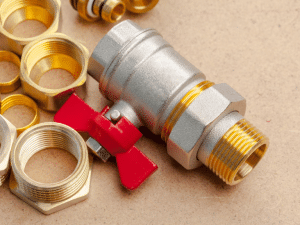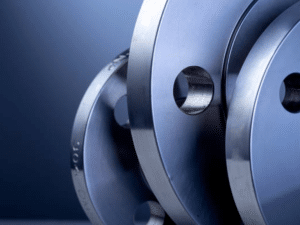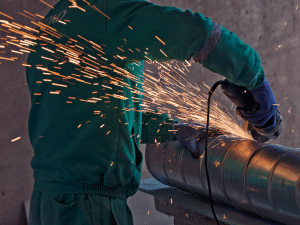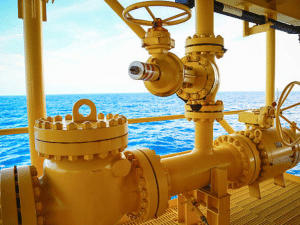The Role of Blank Flanges Suppliers in Oil and Gas Pipeline Safety
In oil and gas operations, safety isn’t optional; it’s built into every connection, every shutdown, and every bit of maintenance. Among the many moving parts in a pipeline system, blank flanges are one of the quiet workhorses. They don’t move, spin, or open, but they serve one of the most important purposes: sealing off pipeline sections to keep everything safe and under control.
And when it comes to getting these right, the choice of blank flanges suppliers matters more than people often realize. A reliable flanges supplier isn’t just a vendor—they’re a safety partner.
What Are Blank Flanges?
A blank flange, also called a blind flange, is a solid disk of metal that’s bolted onto the end of a pipe. It doesn’t have a hole in the middle like other flanges, because its entire job is to block off a pipeline completely.
These are commonly used when part of a pipeline isn’t in use, needs to be sealed during maintenance, or will eventually be extended later on. Simple, yes. But without them, pipelines would be a lot riskier to work with.
How Blank Flanges Help Keep Pipelines Safe?
You can think of blank flanges as reliable gatekeepers. When used properly, they help operators:
- Segment the pipeline to allow workers to execute their work while not disrupting the rest of the system.
- Seal off any high-pressure zones, allowing technicians to inspect or repair the line more safely.
- Stop leaks by sealing off unused pipeline sections, whether it’s for a short time or for good.
- Support testing and shutdowns, especially when you need to control the flow precisely.
It’s not the kind of part that grabs headlines, but in high-pressure systems, it quietly does its job, day after day, keeping things safe.
Why Good Flanges Suppliers Make All the Difference?
Here’s where things get real. You can have the best-designed system in the world—but if the flange isn’t built to the right spec or tested properly, it can still fail. And in oil and gas, failure isn’t just inconvenient. It can be dangerous.
That’s why flanges suppliers play such a critical role. You need people who understand not just how to manufacture flanges, but how those flanges behave under real-world conditions. Suppliers who know the difference between good enough and field-proven.
When you find blank flanges suppliers you can count on, you’re not just buying a product—you’re buying trust.
Supplier Contributions to Reliability and Safety
So, what should a supplier bring to the table? More than just inventory. A good one supports you in ways that really matter:
- Certifications you can trust — ISO, ASME, API, and material traceability reports aren’t just paperwork. They’re proof of quality.
- Parts that last — You want to use parts that have been tested under flow conditions, inspected for defects, and made from solid materials, like stainless steel or carbon steel.
- Responsiveness — When you have an emergency, time to get answers matters. The right supplier gets that.
- Expert insight — Whether you’re facing a complex spec or just need a sanity check, they’re there to guide, not just sell.
You’re building long-term infrastructure. It’s worth partnering with people who care as much about your system’s safety as you do.
How to Choose the Right Blank Flanges Supplier?
Not all suppliers are created equal, and price shouldn’t be the only deciding factor. Here are a few practical tips when narrowing it down:
- Ask what industries they serve – Oil and gas have specific challenges, so find someone who’s familiar with them.
- Look into their testing process – How do they check for cracks, pressure resistance, or dimensional accuracy?
- See how customizable they are – Pipelines aren’t always standard. Your supplier should be flexible if your specs aren’t.
- Read reviews or ask for references – Who else are they supplying? What kind of issues (or successes) have others had?
When it comes to something as critical as pipeline safety, experience and reliability aren’t optional—they’re essential.
Future Trends in Flange Supply
Like anything else, flange supply is changing. Even some of the best flanges suppliers are adapting to the changes in supply.
- There are better materials that will withstand higher pressure, more corrosion, and last longer.
- There are better tracking devices with things like QR codes or RFID tags, allowing teams to know exactly where a particular flange is from and when it needs to be inspected.
- Digital machining leads to better, faster customization of non-standard parts, which reduces lead time.
- There is increased environmental awareness, and many suppliers are reducing waste during the creation of flanges and fittings, seeking cleaner methods to produce them.
This is not about making flanges extravagant. This is about making flanges safer, more reliable, and easier to monitor over time.
Safety Starts with the Right Flange
Stainless steel blank flanges may be dull in appearance, but they provide something critical—control. Control over pressure, safety, flow, and all of this control relies on the trustworthiness of the product and the supplier behind it.
A blank flanges supplier is not just a link in the supply chain; it is part of the safety chain. Blank flanges help you stop things when you want them to stop, keep things going when it matters, and allow you to trust your pipeline every single day in every condition.
In this business, you can’t afford uncertainty. Choose suppliers who understand that and provide accordingly.
FAQs
What certifications should a blank flange supplier provide?
Look for suppliers who offer ISO, ASME, and API certifications, along with material test reports. These show the flange meets recognized safety and performance standards.
How do blank flanges help prevent pipeline accidents?
They fully close off sections of the pipeline, especially under pressure. This helps avoid leaks, pressure spikes, or unexpected releases during shutdowns or repairs.
What materials are best for high-pressure oil and gas applications?
Stainless steel, carbon steel, and alloys are ideal for high-performance. They resist pressure, corrosion, and extreme temperatures commonly found in oil and gas systems.
Can blank flanges be customized for special pipeline designs?
Yes, many blank flanges suppliers can provide custom machining, drilling patterns, or material selections to fit unique designs and pressure requirements.
How often should blank flanges be inspected or replaced?
They should be inspected during every major maintenance cycle. If signs of corrosion, warping, or stress are found, replacement may be needed right away.







